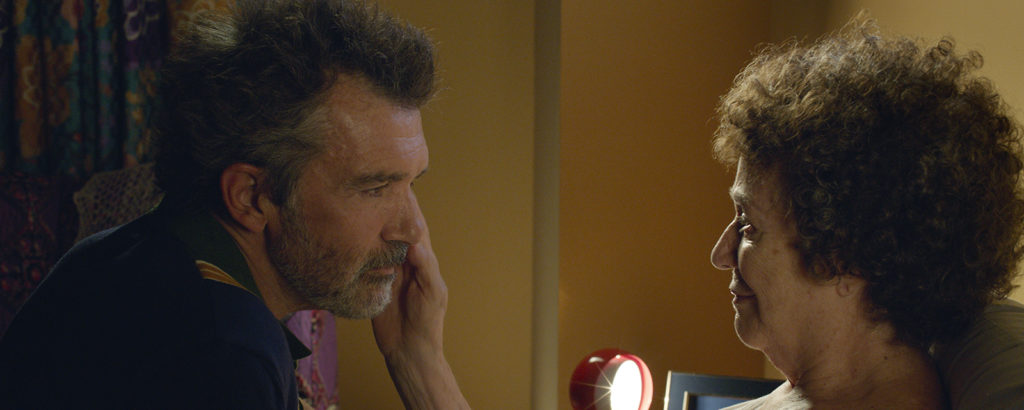Over a century after its inception, we still struggle providing an authoritative definition of “cinema”. One possible description I’d like to offer is the extraction of our subconscious desires unspooled before an audience at twenty-four frames a second. Few filmmakers have undertaken this specific approach with as much visual panache and audacity as Pedro Almodóvar, the Spanish aesthete whose newest film Pain and Glory (Dolor y Gloria) is informed both by his prior filmography as well as the ideological, cultural and sexual touchstones of his own life. Yet the modern maestro of melodrama has produced a mellow, melancholy movie that eschews his signature Sirkian bursts of emotion to introspectively lift back the curtain on the stage of his cinematic universe.
His protagonist and avatar, Salvador Mallo, is a director raised primarily by his mother, Jacinta, in the municipality of Paterna in the 1960s. Both figures are played, respectively, by Antonio Banderas and Penélope Cruz (Julieta Serrano Romero plays Jacinta as an older woman), all staples of Almodóvar’s stock company. Salvador is in the throes of creative paralysis four years after his mother‘ death and two years after a spinal operation stymied any projects. Salvador’s chronic ailment, its history illustrated in an animated montage of grainy diagrams and microscopic neural transmissions, is wryly attributed to the lingering religious doctrine inscribed within him as a boy; more pain prompts him to believe in God, a single source of pain draws him back to atheism.
Indeed, young Salvador was enrolled in a seminary because, his mother explains, “for the poor that’s the only way to study.” The intrusion of constrictive institutions upon a bucolic, even carnal idyll recurs throughout Almodóvar’s work. Yet the scathing ire of a film like Bad Education is supplanted here by a gentler, even wistful vision of paradise lost. The clay house of Salvador’s childhood or a memory of his mother and a group of women washing clothes and cracking jokes on a riverbank are rendered with nearly ghostlike ambience. When the women sing A tu vera by the river, it is yet another reflexive use of music by Almodóvar to express a longing for something which is tangible yet invisible, embalmed in the prison of memory. It’s telling that the film’s opening moments are of a present-day Salvador submerged in a swimming pool, incubating in a surrogate womb.

Salvador delves deeper into his past when he reconnects with Alberto Crespo (Asier Etxeandia), the lead actor from his breakout hit Sabor, after thirty years without contact. The latter endeavors to stage a semi-autobiographical one-man show called La Addición that Salvador has written. The play externalizes Salvador’s psychotropic and neurotic hang-ups while providing Alberto a part after his ongoing heroin addiction caused a rift between the two men. Ironically, they reconcile over Salvador trying the drug out of “curiosity.” “Our only way of relating,” Salvador determines, “is through sacrifice.” By that metric, the artist’s ego must be included when entrusting their work to a collaborative mediator. An elongated shot of Alberto gesturing toward a blank screen set against a deep-red backdrop in the midst of a monologue provides perhaps the most succinct image of Almodóvar’s interest in the dialectic between artifice and candor, as well as stage and screen.

The film’s vivid color palette, courtesy of previous collaborators DP José Luis Alcane and production designer Antxón Gómez, is to be expected in an Almodóvar film. Indeed, this visual familiarity threatens to set the film adrift into the ether of opacity. Yet the script emotionally disarms us with a series of revelations, two of which involve men from Salvador’s past. One is a former lover who sees La Addición and the other a laborer Salvador taught to read and write as an adolescent and who, in turn, inadvertently sparked his sexual and artistic awakening. Both occurrences are marked by serendipitous happenstance verging on melodrama. Yet the way they and Salvador’s relationship with his mother are resolved provide some of the most quietly restrained passages in Almodóvar’s career that are almost unbearably moving in their rueful ephemerality.

If Pain and Glory sounds like a Spanish synthesis of 8 1/2 with The Long Day Closes, it nevertheless transcends cliches to offer a distinct rumination on time and art. By affectionately evincing the mother and men he loved and lost, Salvador, and by proxy Almodóvar, rediscovers the sensual nexus of his craft. “The cinema of my childhood smells like piss and jasmine and the summer breeze,” they both tell the audience. In other words, a fleeting, intoxicating addiction.
